
Bronchitis is the inflammation of the bronchial tubes, these tubes are the airways that bring air into your lungs.
It is known to cause coughing that produces mucus, shortness of breath, a fever, chest tightness and wheezing.
Bronchitis comes in two forms, chronic, which is long term and comes back or never fully goes away, and acute, which is short term and does not reoccur.
Chronic bronchitis is categorized under the umbrella term of COPD or chronic obstructive pulmonary disease.
When the bronchial tubes get inflamed, they produce a lot of mucus, causing a lot of coughing and a difficulty breathing.
Smoking is normally the most common factor of chronic bronchitis, so if you get diagnosed with chronic bronchitis, it is important to quit smoking.
Symptoms of CB:
The most common symptom of chronic bronchitis is a constant cough that does not go away for an extended period of time.
It is common that the cough produces mucus and can cause wheezing and shortness of breath.
Fatigue is also common in those who have chronic bronchitis, as the lack of oxygen can make it hard to be active.
Fever and chills are also symptoms of chronic bronchitis and can be confused for flu or cold like symptoms.
Causes & Risk Factors of CB:

The number one cause of chronic bronchitis is cigarette smoking, as the smoke inhaled into the lungs can irritate the airways and cause inflammation and mucus buildup.
Air pollutants, dust and toxic gases in the environment can be another cause of chronic bronchitis.
Some risk factors include smoking, low resistance, exposure to irritants and gastric reflux.
Cigarette smoke, both firsthand and secondhand smoke, puts those individual at a higher risk of acute bronchitis and chronic bronchitis.
Low resistance can result from another illness, like a common cold, or an immune system disease like lupus.
Older adults, children and infants are all at a higher risk of infection as their immune systems are naturally weaker.
Another risk factor is the exposure to irritants, lung irritants, such as grains, textiles or chemical fumes can all increase your chances of getting chronic bronchitis.
Gastric reflux is also a common risk factor in chronic bronchitis, as the heartburn can irritant your throat and make you more susceptible to developing bronchitis.
Being Diagnosed with CB:
At the beginning of bronchitis, it is common for the symptoms to reflect those of a common cold.
Your doctor may listen to your lungs and listen for any congestion or irritation.
If your doctor concludes that your symptoms are more aligned with bronchitis, there may be tests done in order to see if your lungs are damaged.
The tests include chest x-rays, sputum tests and pulmonary function testing.
Chest x-rays can help determine pneumonia or other conditions that can help explain coughing or congestion.
Sputum tests test the mucus that is coughed up from your lungs, it can also test for any illnesses that may need antibiotics to treat, as well as test for allergies.
A spirometer is used in pulmonary function tests to measure how much air your lungs can hold, as well as how quickly you can expel the air from your lungs.
A spirometer is a device you blow into, it can test for asthma or emphysema.
Treatment for CB:

After a diagnosis of chronic bronchitis, there are ways to treat it that may be different compared to acute bronchitis.
Common medication are bronchodilators, that are used as inhalers to help open up the lungs and breathe easier.
An inhaler helps get medication sent directly to the lungs and can act faster than a pill can.
Normally, your doctor will show you how to use an inhaler if you have never used one before.
Cough suppressants may also be prescribed in order to help coughing at night during bedtime or during the day if it is severe.
Though medication is the first step of treatment, if there is no success, pulmonary rehabilitation or supplemental oxygen may be required.
Pulmonary rehab will help strengthen the lungs and muscles and the goal is to help with exercise and less struggle with shortness of breath.
Supplemental oxygen can help make it easier on the patient by supply a higher concentration of oxygen directly to the airways (via mask or cannula).
Living with CB:
It is most important to make sure you exercise at least 3 times a week, as it can help strengthen the muscles around the lungs.
Even if it can feel like it is exhausting, starting with a slow walk for 15 minutes you can progress over time and eventually you can walk at a brisk pace and go for 25-30 minutes every time.
Speak with your doctor about a healthy and safe exercise plan that you can follow on a day to day basis.
Practicing breathing exercises can also help strengthen your lungs, and they are easy to do and can be done pretty much anywhere.
CB can also increase your susceptibility to lung infections, so it is important to get a flu shot every year and keep up with your pneumococcal shot.
Another way to make CB easier on you at home is to avoid any lung irritants, such as smoke, air pollutants, or toxic gases.
A humidifier can also help make your home have easier to breathe air, most warm air can help with coughing, as well as loosen mucus that can buildup in the airways and lungs.
Outdoor face masks can make it easier on your lungs and airways when you go outside in cold, dry air.
Conclusion:
Chronic bronchitis can make it hard to breathe without the feeling of needing to cough or the feeling of mucus buildup in the airways and lungs.
Knowing the signs and symptoms of CB can make it easier to decide when it is best to go to the doctor.
There are also causes and risk factor to try and prevent, like smoking and exposure to toxic gases, so that you can prevent getting chronic bronchitis.
Your doctor may do some tests in order to see if you do have chronic bronchitis, and then determine a route for medical treatment.
As for treatment, there can be medications, therapy or oxygen supply that can help you breathe easier with chronic bronchitis.
Physical exercise, breathing exercises and meeting with your doctor can all help make it easier on your lungs and airways.



